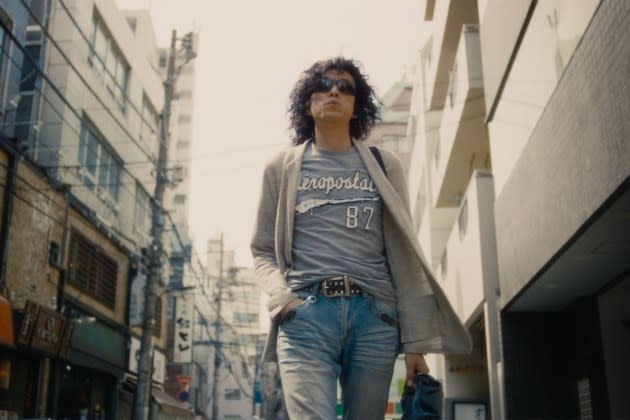‘Mr. Jimmy’: See Clips from Doc About Jimmy Page-Obsessed Kimono Salesman
- Oops!Something went wrong.Please try again later.

The new documentary Mr. Jimmy tells the story of a Japanese kimono salesman named Akio Sakurai, who worships Led Zeppelin guitarist Jimmy Page. For three decades, Sakurai has adopted the persona of “Mr. Jimmy,” playing guitar like Page and attempting note-for-note recreations of Led Zeppelin concerts in Tokyo clubs. After Page encouraged him, he moved to Los Angeles and joined a tribute act, Led Zepagain, to continue his idol worship. The picture, distributed worldwide by Abramorama, is in theaters now.
Filmmaker Peter Michael Dowd tells Rolling Stone he made the film after coming across a YouTube of Sakurai performing “Rain Song: 1979 Version.” “Instantly I was blown away — the outfit, the moves, the feel, and most importantly the playing, it was such an incredible evocation of the magic of Mr. Page. I was hooked,” he says. “After a few more clicks, and seeing him recreate ’70, ’73, and ’77, I found myself typing a breathless email to his Japanese website: ‘Who are you, and what is your story?’ And so it began.” Dowd, who ultimately had to secure the blessing of Led Zeppelin to use their music in the picture, worked on the movie for eight years.
More from Rolling Stone
The Japanese Kimono Salesman Dedicating His Life to Being Jimmy Page
Sharp as a Blade, Soft as a Dream: Jeff Beck's Greatest Songs
A clip from the film premiering at Rolling Stone shows Sakurai playing “Bron-Yr-Aur,” an acoustic instrumental featured on Led Zeppelin’s 1975 album, Physical Graffiti. Sakurai sits outside and fingerpicks the folkish arrangement. “Even after hundreds of years, classical music is still appreciated,” he says in voiceover. “And of course Led Zeppelin’s music should be, too, and will be. I want to keep up the tradition of Led Zeppelin.”
Another clip shows Sakurai testing out a Les Paul, playing some of Page’s most famous licks for guitar amplifier expert Toshio Suzuki. Sakurai offers Suzuki his thoughts on how to make the amp sound more like Page’s tone in 1973. As Suzuki works, Sakurai digresses and starts talking about how the 1972 sound is slightly different than 1973. Suzuki listens patiently and pulls out vintage electrical capacitors that he thinks would emulate the sound. Both men seem unperturbed by the arduous task.
“I filmed this scene for about seven hours,” Dowd says. “And it was remarkably painful to cut it down to size, because it was all so delightfully diabolical. Akio and Mr. Suzuki spent about two hours just studying the effects of shielded versus unshielded power cords on the tone. Soldering in one, then the next, then the next. They even had a live transformer down there and we’re making notes on how varying the current from English to Japanese to American voltages could impact the sound! It was like Dr. Frankenstein with a Marshall and a soldering gun! I loved every minute of it.
“For them, this was simply another routine day,” he continues. “It made me appreciate just how gorgeous Mr. Page’s guitar tone is, and how it too was evolving, expanding, always expressing where he was at in a particular moment.”
Along with a screening of the film, Sakurai himself will perform at Hollywood’s TCL Chinese Theatre on Sept. 15, 16, and 17.
“What blew me away repeatedly was that no matter how many times he had performed these numbers — and remember he has been doing this now for about 35 years — every time he was onstage, the passion in the performance was always at 100 percent,” Dowd says. “As his friend Makoto says in the film, he has held onto that teenage rapture of discovering Led Zeppelin’s music for the very first time for all these years, and it is absolutely undiminished. The purity of his pursuit, the devotion, it is deeply inspiring.”
Rolling Stone also recognized Sakurai’s dedication in its review of the film. “You may shake your head in bemused wonderment watching Sakurai demonstrate the slightly varied ways that the strummed chords of ‘Stairway to Heaven’ were played on different tours throughout the Seventies,” the review says. “But once the originals who created all this music are no longer casting their shadows over arenas and stadiums, people like Sakurai may be the encore we’ll have to accept.”
Best of Rolling Stone
